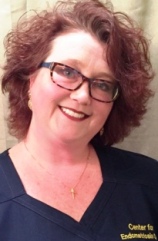Heather Guidone, Program Director, Center for Endometriosis Care
 When and why did you join the Society for Menstrual Cycle Research?
When and why did you join the Society for Menstrual Cycle Research?I was invited as a guest speaker to the 2013 SMCR conference and was immediately impressed by the depth of camaraderie and spirit with which I was welcomed—it felt like “coming home.” I’ve been an active member ever since. The privilege of being in the company of some of the greatest feminist scholars, incredible researchers, women’s health activists, and reproductive professionals remains awe-inspiring to me.
How would you describe the work you do as it relates to the menstrual cycle?
I’ve spent the last 25 years working in menstrual health education and advocacy, with a dedicated focus on endometriosis and the stigmas, menstrual misinformation, and patriarchal bias that persists and enshrouds the disease, thereby stunting its research and treatment progress. Though endometriosis is linked in part to painful menses, the story doesn’t end there; the disease affects menstruators and non-menstruators alike, including pre-menarchal and post-menopausal as well as those trans-identified, gender non-conforming, and even rare CIS males who struggle to access diagnosis and treatment in a traditionally female-identified space. It is a debilitating illness which takes tremendous personal, financial and societal toll—not just on the affected, but on employers, schools, the healthcare system and society at large.
Are you working on a special project or in collaboration with others?
I have the great privilege of collaborating globally with incredible surgeons, practitioners, researchers and academics, activists, advocates, select industry members and disease champions from every corner of the world. Together we strive for progress, not only to elevate the disease as a priority public health platform and debunk the persistent myths and misinformation surrounding it, but also to engage patients as active partners in charge of their own autonomy, care choices and educated/empowered decision-making processes. Also, I was an interviewee for the recently released film
Endo What?, which is changing public perception of what it means to have endometriosis.
What is the most important thing your work has revealed about women’s experience of endometriosis?
That society continues to offer women of all ages—even adolescents, in some cases—hysterectomy as a cavalier “cure” for endometriosis, which it is not. Likewise, menstrual suppression and hormonal interventions remain commonplace, when in fact they do nothing to actually treat the disease. Shockingly, a century after its origin as a fabled panacea, pregnancy is also still being “prescribed” by some providers. Landmark research continues to describe the relentless stigma that “girls just can’t handle menstrual pains” and society continues to dismiss, normalize, and even silence endometriosis patient narratives of dysmenorrhea, dyspareunia, pelvic pain, infertility and more.
Where can visitors to our blog read or learn more about your work?
How has the field of menstrual cycle research or advocacy changed since you entered this area?
It is gratifying to see some of the scales fall away where menstrual taboos are concerned, with menstrual imaging on social media and prominent mention in mainstream media. However, we still have a long way to go to increase menstrual health literacy and address generational bias—it is still routine for daughters to hear the message from doctors or mothers that periods are supposed to be “cripplingly painful.” They are not, and we need to stop normalizing the pain of endometriosis and other diseases that are related in part to menstruation.
It is not enough to merely post images of blood, periods and catchy, attention-getting memes; we must also effect real change. The Internet has been a game changer. Now, anyone can access the literature and become educated on the disease, find kindred spirits in support settings, and become activists in their own right. One drawback, of course, is the rapid propagation of misinformation also found online. But the online platform affords opportunity for everyone to get involved in shifting menstrual paradigms.
What else would you like our readers to know about endometriosis?
The emphasis on treating endometriosis properly must be on high-quality, meticulous, organ-sparing, disease-removing surgery, combined with multidisciplinary approaches—pelvic floor therapy, alternative interventions, nutritional regimens—not on manipulation or cessation of menstruation and oft-unnecessary removal of uterus and ovaries. While we still don’t have timely access for all to better care and the ability to prevent endometriosis, there are things we can do right now, including understanding the patient as a whole person—of whom only one part is illness or disease—alongside ensuring the development of systems and technology that respect the person and preserve the authority and autonomy of that person, regardless of age or stage life.
For information on becoming a member of the Society for Menstrual Cycle Research contact us by email: info@menstruationresearch.org. Subject line: Membership.


